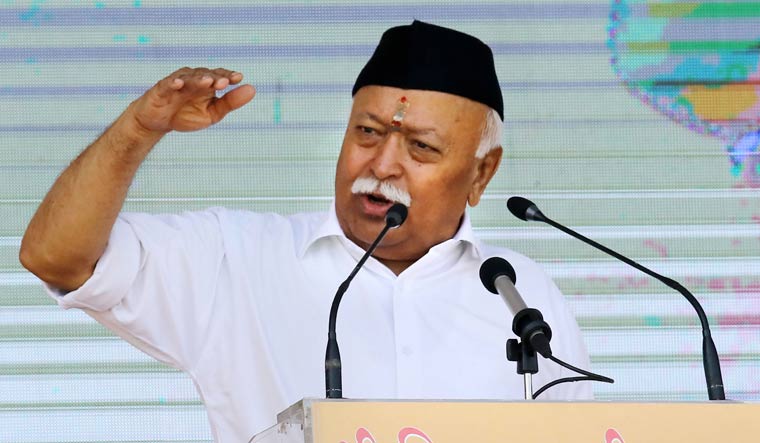Rashtriya Swayamsevak Sangh chief Mohan Bhagwat on Tuesday hailed Prime Minister Narendra Modi and Home Minister Amit Shah for the successful abrogation of the provisions of Article 370 which, according to him, happened after a decisive mandate for the government. The second mandate for the Modi government in 2019 proved that the 2014 results were not merely due to the “electorate's disenchantment” with the previous government, Bhagwat said in his annual Vijayadashami address.
Vijayadashami is an important event in RSS' calendar, where its chief articulates Sangh's vision on current political and cultural issues for its faithful. The significant takeaways from Bhagwat's speech were his answer to Sangh critics, defining of the Hindu rashtra concept again, and endorsement of the government's efforts on national security and economic revival. On the economic issue, the RSS chief showed a shift in the Sangh's views on FDI given the global slowdown. It was earlier opposed to FDI.
Instead of brushing aside the criticism hurled its way, Bhagwat took on Sangh's critics, within and outside the country. He even mentioned Pakistan Prime Minister Imran Khan for attacking the RSS during the latter's UNGA address.
“When one does not succeed in their ill aim, they try to stop the Sangh. Now, even Imran Khan has learnt this mantra. That's why they spread wrong information about Sangh like 'Guruji (Golwalkar) and Sarvarkar were influenced by Hitler'. When we ask for evidence they say there is none,” Bhagwat said.
He tried to answer the biggest criticism hurled in RSS' way by invoking mob violence. Bhagwat said, “there have been reports that members of a community in our society have been attacked by another community, making them victims of social violence. Such incidents have not been one-sided. It has also come to light that some incidents have been deliberately fabricated while some others have been published in a distorted manner.”
The RSS chief said such violence is not of country's tradition, nor is it in line with the Constitution. Bhagwat said the Sangh had never supported the people who were involved in such incidents. He lamented that by calling such incidents using words like ‘lynching’, there was an effort to defame India and the entire Hindu society.
The RSS chief's statement is likely to spark off a debate on whether the RSS was trying to deny the lynching incidents in India.
He emphasised the need to increase goodwill, dialogues and cooperation among all sections of the society and follow the discipline by keeping ourselves within the limits of Constitution.
Another key part of his speech was the articulation of Hindu identity. “The vision and proclamation of the Sangh regarding the identity of the nation, social identity of all of us, and the identity of the country’s nature are clear, well-thought-of and firm that Bharat is Hindustan, a Hindu rashtra.”
He argued that in Sangh's view, the word Hindu is not confined to just those who call themselves Hindus, but even those who are descendants of Indian ancestors, “those who are working for the ultimate glory of the nation and joining hands in enhancing peace by mingling with each other and accepting, respecting and welcoming all diversities.”
He said: “All those Bharatiyas are Hindus. Whatever may be their mode of worship, language, food habits, lifestyle and native place... those will not make any difference.”



